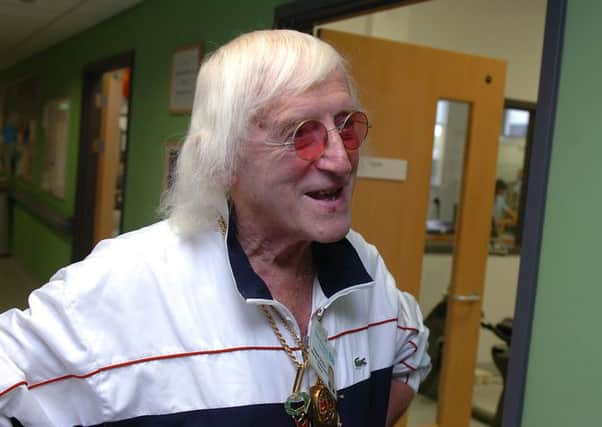140 Savile victims seek compensation from estate, NHS and BBC


Mr Justice Sales said the scheme - agreed between the executor of Savile’s estate and lawyers representing alleged victims - would allow for “sufficient objective scrutiny” of the merits of compensation claims.
The judge has analysed the scheme in a written ruling on a dispute between the estate executor - the NatWest bank - and a charitable trust which is the major beneficiary of the estate.
Advertisement
Hide AdAdvertisement
Hide AdHe had sanctioned the scheme, and dismissed an attempt to replace the NatWest bank as estate executor, following a High Court hearing in London in February.
And he outlined his reasoning behind those decisions in a written ruling handed down in London today.
Lawyers had initially put the value of Savile’s estate at around £4 million. But Mr Justice Sales said a “range of expenses” had been incurred and the estate’s current value was about £3.3 million.
He said about 140 people had “intimated to the bank” that they had personal injury claims against Savile and his estate in relation to sexual abuse.
Advertisement
Hide AdAdvertisement
Hide AdHe said there had also been indications of claims against other organisations Savile had been associated with - the BBC, a number of NHS hospital trusts and the charities Barnardo’s and Mind.
“The claims which the claimants have brought forward have not been the subject of determination in court proceedings and in that sense remain untested allegations,” said Mr Justice Sales.
“But there is no serious dispute that some, perhaps many, of the claims may be well-founded and meritorious.
“If such claims are substantiated, there is a serious possibility, to put it no higher, that they would exhaust the money remaining in the estate.”
Advertisement
Hide AdAdvertisement
Hide AdThe judge said claims would not have to be made under the compensation scheme - and he said claimants had a right to launch court proceedings.
But he said it was likely that claiming under the scheme would attractive to “many or all”.
“Use of the scheme will provide a good opportunity for their claims to be quickly and inexpensively scrutinised by a barrister, so that they have a reasonable chance of reaching a settlement at an agreed level which can be regarded as fair,” said Mr Justice Sales.
“Agreement about that will in turn help the bank to get to a position in which the full amount of valid claims is known, so that it can decide whether and in what amounts they can be paid out of the estate.”
Advertisement
Hide AdAdvertisement
Hide AdThe judge said claimants who did not claim or settle under the scheme would have a “difficult choice”.
“They can go to court but that may involve them in expense which may prove to be irrecoverable; they may fail in their claim and receive nothing; they will be on risk of an award of costs being made against them in favour of the estate if they lose, or if they have failed to apply under the scheme without good reason,” he said.
“In my judgment, the proposed scheme is a sensible and pragmatic attempt at a solution to the complex situation which confronts the estate.
“It seeks to strike a fair balance between the objectives of providing for reasonable objective scrutiny of claims against the estate whilst minimising the costs of dispute resolution and seeking to maximise the scope for distributions out of the estate to those who are really entitled to it.”
Advertisement
Hide AdAdvertisement
Hide AdHe added: “In my view, the provisions of the scheme allow for proportionate and sufficient objective scrutiny of the merits of the claims, consistent with the proper administration of the estate.”
A solicitor representing alleged victims had said, after the hearing in February, that the scheme would not guarantee payouts but would provide a framework within which claims could be analysed.
Liz Dux, who works for law firm Slater & Gordon, had said the BBC and NHS also supported the scheme.
She had described the judge’s decision to sanction the scheme as “a great result for the victims of Jimmy Savile”.
Advertisement
Hide AdAdvertisement
Hide AdThe Jimmy Savile Charitable Trust - the major beneficiary of the estate - had wanted the bank replaced as executor.
Trust bosses had said they were unhappy with the bank’s performance as executor and had suggested that compensation issues had not been fully thought through.
They told the judge that a new administrator should be appointed.
NatWest disagreed.
And Mr Justice Sales had dismissed the trust’s application - and approved the compensation scheme - at the end of a three-day hearing.